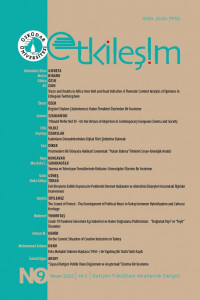A Critical Analysis of the Public Sphere in the Digital Age: The Case of the Petrocaribe Challenge Movement
Petrocaribe Challenge, Digital media, The Public sphere, Political communication, Political economy
___
- Adamoli, G. C. E. (2012). Social media and social movements: A critical analysis of audience's use of Facebook to advocate food activism offline (Doctoral dissertation, Florida State University, Florida). Retrieved from: http://diginole.lib.fsu.edu/islandora/object/fsu%3A183217
- Adorno, Th. W. (1964). L’industrie culturelle. Communications, 3 (3), 12-18.
- Berelson, B. (1952). Content Analysis in Communication Research. Michigan: Free Press
- Bhattacherjee, A. (2012). Social science research: Principles, methods, and practices. Tampa: University of South Florida.
- Cardon, D. et Granjon, F. (2010). Médiactivistes. Paris: Les Presses de Sciences Po.
- Castor, S. (1988). L’occupation américaine d’Haïti. Port-au-Prince: CRESFED.
- Charaudeau, P. (2005). Le discours politique. Les masques du pouvoir. Paris : Vuibert.
- Creswell, J.W. (2012). Educational research: planning, conducting, and evaluating quantitative and qualitative research. Boston, MA : Pearson.
- Dahlber-Grundberg, M. (2016). Digital media and the transnationalization of protests (Doctoral dissertation, Umea University, Sweden). Retrieved from : https://umu.diva-portal.org/smash/get/diva2:895571/FULLTEXT01.pdf
- Fuchs, C. (2014). Social media: A critical introduction. London: SAGE
- Gonzáles, L. A. G. (2016). New social movements and social networking sites’ uses: Mexicans’ mobilization for peace in Mexico (Nottingham Trent University, Nottingham). Retrieved from: https://core.ac.uk/download/pdf/46664584.pdf
- Habermas, J. (1989). The structural transformation of the public sphere. Cambridge, MA: MIT Press.
- HABERMAS, J. (1997). L’espace public : Archéologie de la publicité comme dimension constitutive de la société bourgeoise. Traduit de l’allemand par Marc Buhot de Launey, Paris: Payot.
- Habermas, J. (2006). Political communication in media and society: Does democracy still enjoy an epistemic dimension? The impact of normative theory on empirical research. Communication Theory, 16, 411-426. doi:10.1111/j.1468-2885.2006.00280.x
- Herman, E. S. and Chomsky, N. (1988). Manufacturing consent. The political economy of the mass media. New-York: Pantheon Books. Retrieved from: https://www.marxists.org/archive/marx/works/download/Marx_Contribution_to_the_Critique_of_Political_Economy.pdf
- Johannessen, M. R. (2012). Social media as public sphere. An exploratory study of online political communication in Norway (Doctoral dissertation, Universit of Adger, Kristiansand). Retrieved from: https://uia.brage.unit.no/uia-xmlui/handle/11250/139746
- Kaplan, A.M. (2014). Socıal media, definition and history. In Alhaji R., Rokne J. (Eds) Encyclopedia of Social Network Analysis and Mining. New-York: Springer.
- Laflamme, S. et Lafortune, S. (2006). Utilisation d’Internet et relations sociales. Communication, 24(2). Retrieved from: http://communication.revues.org/3395 Marx, K. (1999). A contribution to the critique of political economy. Transcribed for the Internet by Tim Delaney. Retrieved from Miège, B. (2004). L’économie politique de la communication. Hermès, La Revue, 1(38), 46-54.
- Mosco, V. (2009). The political economy of communication. London: SAGE.
- Pierre-Louis, L. R. (2012). Communication et espace public. Une reconstruction à travers l’espace public politique haïtien. Louvan-la-Neuve. Presses Universitaires de Louvain.
- Smythe, D. W. (1997). Communications: Blindspot of Western Marxism. Canadian Journal of Political and Social Theory, 1(3), 1-27.
- Trouillot, M-R. (1986). Les racines historiques de l’État duvaliérien. Port-au-Prince: Henri Deschamps.
- Van Dijk, T. A. (1993. Principles of critical discourse analysis. Discourse & Society, 4 (2), 249-283.
- Wittel, A. (2012). Digital Marx: Toward a political economy of distributed media. TripleC, 10(2), 313-333.
- ISSN: 2636-7955
- Yayın Aralığı: Yılda 2 Sayı
- Başlangıç: 2018
- Yayıncı: Üsküdar Üniversitesi
Neoliberal Toplumsal Dinamikler Ekseninde Kentsel Mekânların Kurgusu: Karaköy Örneği
Swedish Media, Fundamental Values and the Opinion Corridor in the 2018 Election
Online (Çevrim İçi) Arabuluculuk: Arabulucuların Sosyal Medya Kullanma Deneyimi Üzerine Bir Çalışma
Marc-henry PIERRE, Mehmet GÜZEL
Sosyal Medyada Propaganda Modelinin Karşılığı: Gözetimin Tüketimi Üzerine Bir İnceleme
İnternet Galaksisi, İnternet, İş Dünyası ve Toplum Üzerine Düşünceler
Yeni Yönetim Yaklaşımlarının İletişim Anlayışı
Mitten büyüye: İnteraktif, Sembolik Mağma - Dr. Maureen Ellis ile bir söyleşi
